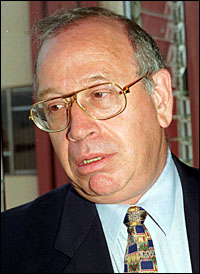Vladimiro Montesinos and the Art of the Bribe
By Jason Felch and Michael Montgomery
Part 1, 2, 3, 4
 | Peruvian television station
owner Baruch Ivcher
AP Photo/STR |
But not all of Peru's media owners capitulated. In 1996, Peru's Channel Two began airing hard-hitting investigative reports on a program called Contrapunto or Counterpoint. The stories raised allegations about Montesinos' links to death squads, drug traffickers and even the U.S. Central Intelligence Agency.
Channel Two's owner is Baruch Ivcher, an Israeli who became a naturalized Peruvian citizen in the 1980s. Ivcher says one day Montesinos sent emissaries with a proposal:
"They offered me $19 million and asked only one condition, one thing," he recalls.
That was for Ivcher to hand control of his news program Contrapunto to Montesinos.
When Ivcher refused, he says Montesinos revoked his citizenship and forced him into exile.
Why didn't Montesinos kill Ivcher?
"First of all the question should be why Montesinos paid money to the owners of the television stations and didn't just take the TV stations," he says. "They wanted to sell to the world that they are democrats."
From exile, Ivcher tried to convince the world that Peru wasn't a democracy. He lobbied the U.S. Congress and enlisted human rights groups. But Montesinos was a valued ally to U.S. intelligence agencies, namely the CIA.
"He was the go-to guy. He was one of the primary contacts we had with top levels of the Peruvian government," says Bruce Goslin, a retired CIA field agent. In the mid-1990s, Goslin was assigned to Peru where he was a liaison to Montesinos. Goslin says for years, U.S. intelligence agencies maintained close ties to Montesinos despite concerns about his possible links to death squads and drug traffickers.
"We called him the dark prince," says Goslin. "He fancied himself a Machiavelli. He enjoyed being behind the scenes and controlling power. No major decision could be made by the Peruvian government without his involvement."
The CIA declined to comment, but Goslin says the relationship was closely controlled by officials in Washington. Goslin says the U.S. government paid millions of dollars to assist Peruvian intelligence, and that some of it may have been diverted by Montesinos for use against his political opponents. But he says the assistance also helped the country.
"Peru, in many instances, can point to successes in terms of intelligence programs and how it helped them win the war against the Shining Path [revolutionary group]. Obviously there were a lot of problems, a lot of abuses, and there were a lot of horrific human rights violations, but a lot of instances when there were successes and weren't human rights violations and I think the U.S. government had a lot to do with that," says Goslin.
Go to Part 4
| 


